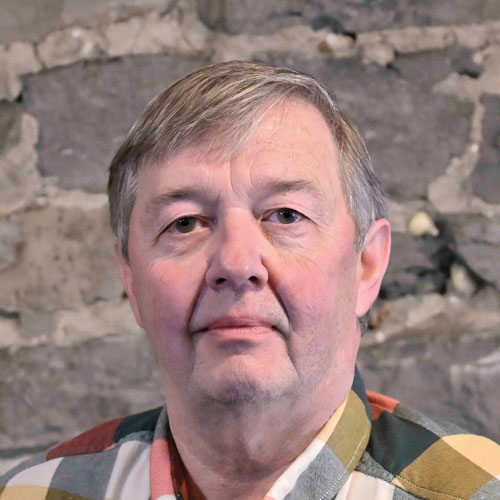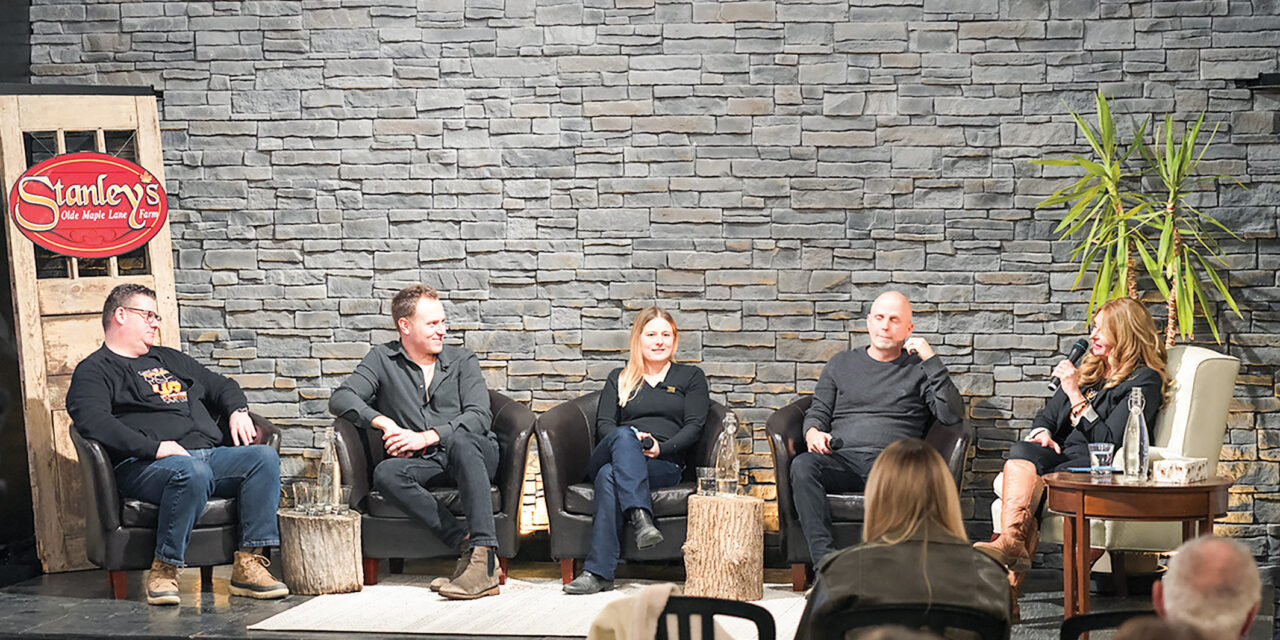After speaking about their individual journey, each of the four speakers took part in a discussion about what they had encountered and the tools they used to overcome the problems they faced. Tinkess Photo
EDWARDS – Last summer when Stanley’s Olde Maple Lane Farm joined forces with Vintage Iron to host Tractor Jam on Stanley’s property near Edwards, the thought was that the proceeds from the event should go towards agricultural mental health care and prevention. The consequences of that generous act came to fruition on a very foggy Nov. 22 evening in Stanley’s reception hall, when the Dare to Be Vulnerable Project made a stop to shine a light on some of the mental health challenges faced by Canadian Farmers.
The Dare to be Vulnerable Project was founded by Susan Blain to help end the stigma of suffering with mental health issues. By speaking out, by having “courageous conversations”, takes back control of the narrative and in the process can discover that they are not alone.
The first speaker of the evening was Lisa MacLeod, a six-term member of Ontario’s Provincial Parliament. Throughout her career MacLeod has been a champion for mental health awareness, suicide prevention and anti-bullying. In 2022, she learned that she was bipolar, and because she is in the public eye as a politician, she felt she needed to go public, and in doing so, she says she did not experience any stigma. It does though, send your life into a series of ups and downs. “There are days when I can work 15-16 hours and a few weeks later I’m spending the next five weeks in bed.”
She explains that there was and is a lot to learn. “I’m learning about drugs and circadian rhythm and therapy and medication.”
The next speaker was Susan Blain, who explained that it wasn’t until she had “gone through my journey,” that she realized that something was wrong. “It wasn’t until I started really working in mental health, I realized that I’ve been struggling for a long time,” said Blain. “One of the messages that’s most important for me is to let everybody know that we all have a mental health. It’s not something inside of us. It’s something that we all have.
“The question is, where are we on the spectrum? Are you in the red zone, perhaps you are in the green zone? Are we somewhere in between? And on any given day, we could be anywhere on that scale.”
In 2019, Blain suffered a major trauma in her life. “Through an act of betrayal, I lost everything. And I was just going into my 55th year. The loss of my home, I lost $100,000 in savings. I wasn’t working and I was homeless, and I was left with $50,000 in debt. It was a very dark time for me,” said Blain.
“I landed up in the hospital. Check out the day: March 11, 2020, just days before COVID struck the world. I went into the Queensway Carleton hospital. And the reason I went into the hospital is because I was brave enough to have a courageous conversation with my best friend and let her know what was going on in my thoughts.” If you talk, you might be surprised how many people are listening.
Blain provided some statistics to show how serious the mental health crisis in Canada has become. The Conference Board of Canada and Statistics Canada report that one in four Canadians are having mental health issues. Sadly, 60 per cent of those surveyed claim the stigma and discrimination experienced are more damaging than the symptoms of their mental health problems, which is why so many suffer in silence and why events like Dare to be Vulnerable are so necessary. They provide a safe venue where the words of a few make it easier for many more to open up and discover that there is help out there.
The next part of the evening saw four people, a restauranteur, a professional hockey player, a former nurse and a writer, farmer, broadcast personality tell their story. Each provided details of what they had experienced, how they got through it/are getting through it, and the things they have in their “toolbox” that helps them deal with things on a day-to-day basis.
Next came the “open mic” portion of the evening, where other individuals from the audience had an opportunity to share their experiences. Again, no two situations were completely alike, but there were similarities both in the problems and the solutions or ‘tools” being used.
Would these people have spoken if they had been handed the mic earlier in the evening? It is impossible to tell, but you can draw from their attendance, that they at least were considering the idea.
As the evening ended, Earl Stanley, the evening’s host told the story of the money raised at Tractor Jam and how Carson Hill and Wayne Fraser, the president and vice-president respectively of Vintage Iron had driven to Florence, Ontario, near Chatham to deliver a portion of the funds ($3,000) to a family who had lost their son to suicide two years ago. With the money from his insurance policy, they had built in his memory a cottage for use primarily by farmers and first responders. Another portion of the receipts from Tractor Jam ($3,000) were given to Susan Blain for use by Dare to be Vulnerable.
The remaining balance was given to the Junior Farmers, who had worked the gate, collecting donations on the day of Tractor Jam.
The final words of the evening were given by Earl Stanley and were, as you would expect, straight-forward, to the point, and given with a smile on his face. “Thank you, thank you everybody, thank you so much. In closing I guess it’s been a great evening and I appreciate it; I really hope somebody goes away with something.”
If you’d like to know more about the Dare to be Vulnerable Project, you can visit their website at daretobevulnerable.com.
If you are a farmer and you’re going through a rough period, there is help out there. You can reach the Farmer Wellness
Initiative at farmerwellnessinitiative.ca or by calling 1-866-267-6255. It is a free service that is available for farmers and their families 24 hours a day, seven days a week, 365 days a year.

Terry Tinkess is a professional photographer, educator and journalist. He has been making a living with a camera and keyboard since 1999 and has been featured in such publications as The Ottawa Citizen, Cornwall Standard Freeholder, The Globe and Mail, The Miami Herald, Ottawa Construction News, The Ontario Construction Report, Ontario Home Builder Magazine, Reed Construction Data, Canadian Potato Business and most recently, The Record and Eastern Ontario AgriNews. Terry lives in Ingleside, Ontario with his wife Brenda, Mia the anxious Pittie and cats Wally and Chubbers.









